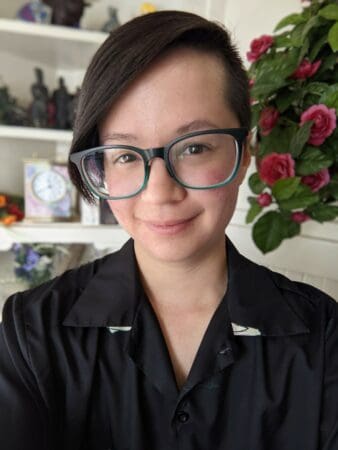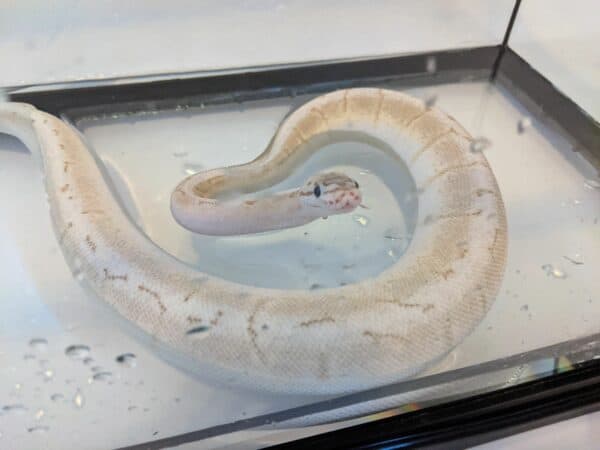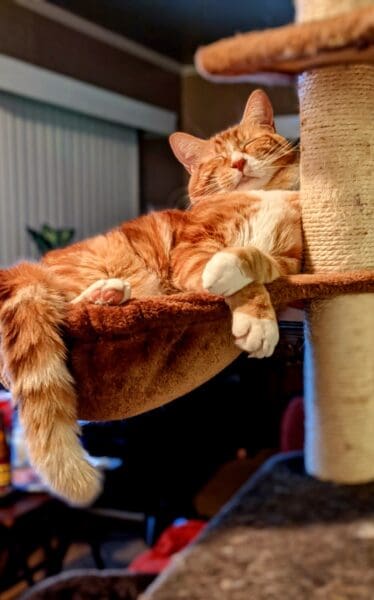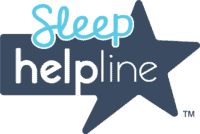Alex: Celebrating 2022 LGBTQ+ Pride Month Part 3
June is LGBTQ+ Pride Month! Project Sleep is proud to highlight insights from LGBTQ+ members of our community throughout the month of June.

I live in the Bay Area, California, with my wonderful fiancé, Matt, and our little zoo – two cats, four snakes, and two lizards! Most of my animal companions are rescues or from foster homes; taking care of animals is intensely important to me. When I first met my scaly friend Jasper, he was just a tiny, scrawny baby, left to live outside, vulnerable to the elements. Additionally, he lives with a chronic neurological disorder due to unethical breeding practices that produced his unique coloration. This disorder, when left unmitigated, causes corkscrewing of the neck, head shaking, and inability to strike prey correctly.
Today, Jasper has transformed from a weak, struggling yearling, to a full adult with blooming colors and massively diminished signs of his disorder. I am a firm believer that love, support, and the right environment can give strength to even the scaliest of creatures. He flaunts his sleek white scales, stunning light blue eyes, and a playful mix of stripes and spots down his spine.
My animal companions remind me on a daily basis that living a full, beautiful life is still possible, regardless of tough or traumatic beginnings, or being a little bit different from the status quo. I am transgender non-binary, asexual, half Chinese, and chronically ill, and I aim to embrace this intersectional identity as a source of power.
What is your sleep disorder? At what age were you diagnosed?
I was diagnosed earlier this year with narcolepsy with cataplexy, at age 27. Like many people with narcolepsy, it was a long and grueling journey toward diagnosis. I started seeing “shadow people” (i.e., hypnogogic hallucinations) during the night when I was six years old. I continue to struggle with excessive daytime sleepiness (EDS) and disruptive nighttime sleep, and experienced cataplexy (temporary muscle paralysis) for five years before I was diagnosed. Almost every medical professional I interacted with did not believe my symptoms were real. I consider myself extremely lucky to have a doctor willing to treat me, as I have state-provided health insurance, Medi-Cal.

Jasper, bathing after one of many tick and mite treatments during his initial recovery. He’s a trooper!
In your experience, are there similarities and/or differences between living with a sleep disorder and identifying as LGBTQ+?
I think the most illuminating similarity between living with a rare chronic sleep disorder and living as LGBTQ+ is how people in my life tend to become awkward and avoidant around both topics! When I first came out as transgender in 2015, I had to explain what being transgender meant to a seemingly unending amount of people. A mix of fear, misinformation, and mystique tended to follow these “coming out” talks. Whether asked with tact or not, almost every person in my life wanted to know why I was transgender. Even the most caring, empathetic people in my life struggled to understand why I was transitioning, and many conversations began and ended with half-finished sentences of, “So, why are you … ?” Many people chose to cut me from their lives after I came out, including my family, though some of us have managed to reconnect after many difficult years.

Mr. Wesley sleeping in his favorite hammock. Like me, Wesley is quite anxious and shy, but he’s got lots of love in his heart! He was rescued and fostered by a queer couple after being abandoned by his mom.
Similarly, when I started sharing the struggles of obtaining my narcolepsy diagnosis, I was met with floundering disbelief by my friends, family, and medical professionals alike. Doctors assumed I was faking or lying about my condition; family assumed my symptoms were something recent and not something I had been struggling with almost my entire life. This time, the question was mostly left unasked, but an implied, “Are you actually sick?” has surrounded many a conversation. I have recently felt myself become quite scrutinized when I’m out in public, just like when I first came out, especially when I choose to use my mobility aid.
However, not everything about being LGBTQ+ and disabled is glum! Through a miscommunication at Jazz Pharmaceuticals, producer of narcolepsy medication Xyrem, I discovered Wake Up Narcolepsy. Through them, I found an LGBTQ+ online support group for people with narcolepsy that meets every Friday, run by Tatiana Corbitt. The support group has been an invaluable resource and has strengthened me in so many ways, giving me courage and hope for a better future.
What does Pride Month mean to you?
Pride Month has had many mixed meanings – and feelings – for me over time. When I was in high school, deep in repression about my identity, Pride Month always made me feel sad and excluded, for reasons unknown to me. When I was still questioning and uncertain in my early college years, I still felt like it wasn’t the right space for me because I wasn’t truly “out” yet. Then, when I came out as transgender, it felt like something I was forced to participate in, and all I wanted to do was hide away.
This year, I chose not to truly “come out” as asexual as much as quietly add it to my one social media account. Pride Month now means a space to share my story, dispel fears and myths, and act as a platform to mold and form my queer identity as something to be celebrated! I’m happy to be participating in my first-ever Pride this year, seven years after coming out.
What advice would you give someone who is earlier in their journey in the sleep and/or LGBTQ+ community?
Seek support anywhere you can find it! It doesn’t matter if that support comes from an online forum, your family, or one close confidante. Just one person sharing and connecting with you can make the difference between seeing a bleak future and a brighter one. It can be incredibly scary to make yourself vulnerable in the beginning, but the rewards are more than worth it. You are never alone in your journey! For LGBTQ+ youth, I would highly recommend The Trevor Project for 24/7 support.
Thank you, Alex, for sharing your voice! Find Alex on Instagram: @ace__alexx.
To join the Wake Up Narcolepsy LGBTQIA+ online support group, make an account on HeyPeers.com and follow Wake Up Narcolepsy. From there, you’ll be able to see all of the groups and register. Living with Narcolepsy – LGBTQIA+ meets on Fridays at 1pm (PT).





